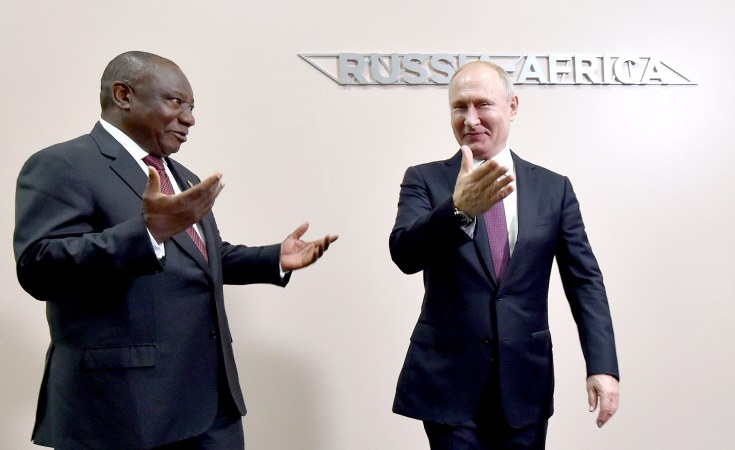A delegation of four African heads of state are headed to Kyiv and Saint Petersburg to meet President Volodymyr Zelensky and President Vladimir Putin, in the latest in a series of mediation efforts aimed at ending the war between Russia and Ukraine.
The presidents of Comoros, South Africa, Zambia and Senegal are expected in Kyiv on Friday morning, having boarded a special train from Poland on Thursday evening.
The heads of state - Cyril Ramaphosa of South Africa, Senegal's Macky Sall, Zambia's Hakainde Hichilema and the president of the Union of Comoros, Azali Assoumani, who is also the current chairperson of the African Union - are also expected to travel to the town of Bucha, devastated by Russian attacks against civilians.
Bilateral talks are on the agenda for Friday afternoon, followed by an official ceremony with Ukraine's president and a press conference.
The African delegation will leave Kyiv on Friday evening for Saint Petersburg, where they are expected to meet Russia's President Vladimir Putin.
The initiative was set up by French businessman Jean-Yves Ollivier, who heads the non-profit Brazzaville Foundation. Ollivier has been working on this project since December 2022, travelling between Kyiv, Moscow, Washington, London and various African capitals.
Knock-on effects
The delegation is short of three presidents who had been expected to join: Egypt's President Abdel Fattah El-Sisi is not travelling and will be represented by his prime minister, while Uganda's foreign minister will stand in for President Yoweri Museveni, who has Covid.
Meanwhile Denis Sassou Nguesso, president of the Republic of the Congo, is no longer part of the delegation because, according to a source close to him, "the situation on the ground [Russia and Ukraine] has worsened and the conditions are not ideal for a peaceful and fruitful dialogue".
Africa has a firm interest in working towards an end to this conflict, because as Stanley Kakubo, Zambia's foreign minister, pointed out: "The war in Ukraine has a devastating effect on African communities resulting in food insecurity because of the rising costs of grain and fertilisers."
Vital sectors such as energy, security and international finance have also been hard hit.
Scepticism
Some observers questioned how heads of state from smaller countries would succeed in influencing Russia where India and China have failed.
Victor Kgomoeswana, an Africa commentator from the University of Limpopo in South Africa, told RFI that China is not in an ideal position to succeed as a mediator because it shares common interests with Russia over Africa, and both countries are on the opposing side to Europe and the US.
"China cannot intervene because it is the real target of the stand-off. Africa-China trade has risen exponentially while trade from the continent with Europe and the United States has stayed much the same.
"So the United States is worried about a global shift of power towards China and Russia," he said.
Pressure from US
Early this week, the White House said it had concerns over South Africa's potential security partnership with Russia.
It came after a group of US lawmakers questioned whether South Africa should remain in the African Growth and Opportunity Act (AGOA), which offers duty-free access to the US market for African countries that meet democratic criteria.
In a letter to senior officials, they also called for the AGOA Forum - a trade summit planned to be held in Johannesburg later this year - to be moved from South Africa over what they said was the country's "deepening military relationship" with Russia.
The US ambassador to South Africa alleged in May that a Russian freighter loaded up weapons and ammunition on a stop at a Cape Town naval base. South Africa also joined Russia and China in joint naval drills in the Indian Ocean in February, in what it called a "routine exercise".
The South African government insists it is neutral in the war on Ukraine.
'Not our war'
RFI's listeners on the African continent shared their doubts about the mission on "Appels sur l'actualité", RFI's daily call-in show.
"The initiative for the mediation is not even that of the Africans but comes from the Brazzaville Foundation," Levi from Brazzaville said.
Tiburce, from Libreville, told RFI that the African leaders' mediation is "ridiculous, as they have had no solutions for the conflicts in Africa".
"It is like trying to put out the fire at your neighbour's place when your own house is burning down," he said.
Another listener, Bala Coulibaly, told RFI that "this is not our war".
"Why are we providing so much effort towards territories which are thousands of kilometres away while our own countries, Mali, Sudan, Niger, Burkina Faso, Chad, are rife with conflicts," he wondered.
Kgomoeswana told RFI that people underestimate Africans' success in negotiating settlements.
"Africans spent much of their history negotiating. South Africa negotiated its way out of apartheid, which is nothing short of a miracle.
"Conflicts and stand-offs in Liberia, Côte d'Ivoire, Tigray, DRC have been resolved by Africans themselves," he said.
He believes that Africa has leverage others don't.
"African leaders have the bargaining chip because the Americans want a bigger portion of trade on the continent," he says.
"So on the one hand you have the US-Europe bloc and on the other hand China who are both courting the same lady, and she is Africa and its billion-plus market."


